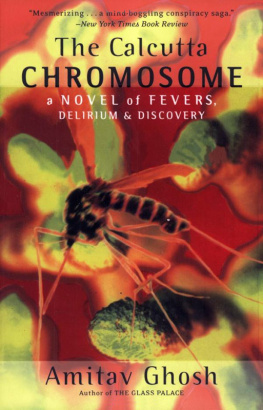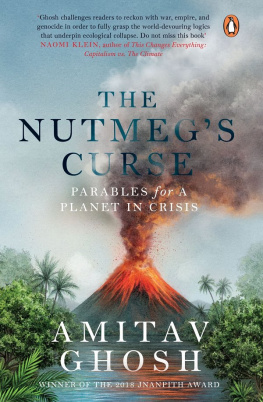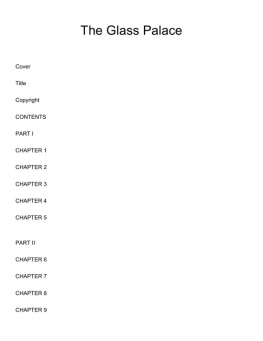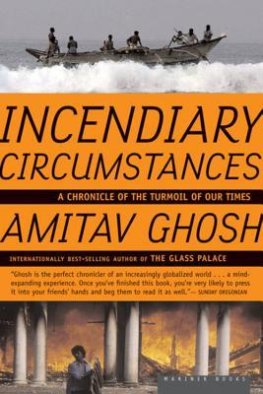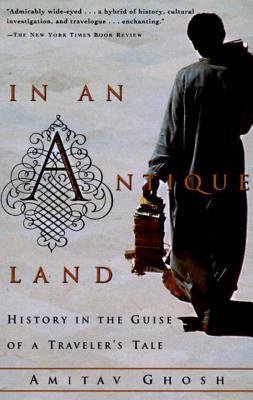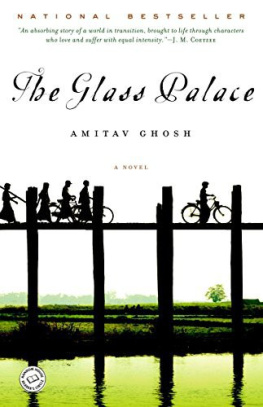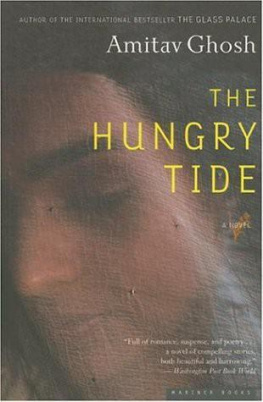Amitav Ghosh - The Calcutta Chromosome. A novel of fevers, delirium and discovery
Here you can read online Amitav Ghosh - The Calcutta Chromosome. A novel of fevers, delirium and discovery full text of the book (entire story) in english for free. Download pdf and epub, get meaning, cover and reviews about this ebook. year: 1995, publisher: Avon Books / Harper Collins, genre: Art / Science fiction. Description of the work, (preface) as well as reviews are available. Best literature library LitArk.com created for fans of good reading and offers a wide selection of genres:
Romance novel
Science fiction
Adventure
Detective
Science
History
Home and family
Prose
Art
Politics
Computer
Non-fiction
Religion
Business
Children
Humor
Choose a favorite category and find really read worthwhile books. Enjoy immersion in the world of imagination, feel the emotions of the characters or learn something new for yourself, make an fascinating discovery.
- Book:The Calcutta Chromosome. A novel of fevers, delirium and discovery
- Author:
- Publisher:Avon Books / Harper Collins
- Genre:
- Year:1995
- Rating:3 / 5
- Favourites:Add to favourites
- Your mark:
- 60
- 1
- 2
- 3
- 4
- 5
The Calcutta Chromosome. A novel of fevers, delirium and discovery: summary, description and annotation
We offer to read an annotation, description, summary or preface (depends on what the author of the book "The Calcutta Chromosome. A novel of fevers, delirium and discovery" wrote himself). If you haven't found the necessary information about the book — write in the comments, we will try to find it.
The Calcutta Chromosome. A novel of fevers, delirium and discovery — read online for free the complete book (whole text) full work
Below is the text of the book, divided by pages. System saving the place of the last page read, allows you to conveniently read the book "The Calcutta Chromosome. A novel of fevers, delirium and discovery" online for free, without having to search again every time where you left off. Put a bookmark, and you can go to the page where you finished reading at any time.
Font size:
Interval:
Bookmark:
I am very grateful to Raj Kumar Rajendran of the Department of Computer Sciences, Columbia University for his advice on certain details. I am especially indebted to Alka Mansukhani of the Department of Microbiology, New York University Medical Center: her ideas and support were essential to the writing of this book.
This is a work of fiction. Names, characters, places, and incidents either are the products of the authors imagination or are used fictitiously. Any resemblance to actual events, locales, organizations, or persons, living or dead, is entirely coincidental and beyond the intent of either the author or the publisher.
A hardcover edition of this book was published in 1995 by Avon Books.
THE CALCUTTA CHROMOSOME . Copyright 1995 by Amitav Ghosh. All rights reserved. Printed in the United States of America. No part of this book may be reproduced in any manner whatsoever without written permission except in the case of brief quotations embodied in critical articles and reviews. For information address HarperCollins Publishers Inc., 10 East 53rd Street, New York, NY 10022.
HarperCollins books may be purchased for educational, business, or sales promotional use. For information please write: Special Markets Department, HarperCollins Publishers In., 10 East 53rd Street, New York, NY 10022.
Designed by Kellan Peck
First Perennial edition published 2001.
The Library of Congress has catalogued the hardcover edition as follows:
Ghosh, Amitav.
The Calcutta Chromosome : a novel of fevers, delirium and discovery / Amitav Ghosh. 1st ed.
p. cm.
ISBN 0-380-97585-8
I. Title
PR9499.3.G536C36 1997
97-3154
823dc21
CIP
ISBN 0-380-81394-7 (pbk.)
01 02 03 04 05 WB / RRD 10 9 8 7 6 5 4 3 2 1
For Koeli |
This day relenting God Hath placed within my hand A wondrous thing; and God Be praised. At His command, Seeking His secret deeds With tears and toiling breath, I find thy cunning seeds, O million-murdering Death. Sir Ronald Ross (Nobel Prize for Medicine, 1902) |
august 2 | |
m | osquito day |
one
I F THE SYSTEM hadnt stalled Antar would never have guessed that the scrap of paper on his screen was the remnant of an ID card. It looked as though it had been rescued from a fire: its plastic laminate had warped and melted along the edges. The lettering was mostly illegible and the photograph had vanished under a smudge of soot. But a four-inch metal chain had somehow stayed attached: it hung down in a rusty loop from a perforation in the top left-hand corner, like a drooping tail. It was the chain that tripped the system, not the card.
The card turned up in one of those routine inventories that went flashing around the globe with metronomic regularity, for no reason that Antar could understand, except that it was what the system did best. Once it got started it would keep them coming, hour after hour, an endless succession of documents and objects, stopping only when it stumbled on something it couldnt file: the most trivial things usually.
Once it was a glass paperweight, of the kind that rain snowflakes if you turn them upside down; another time it was a bottle of correcting fluid, from an irrigation overseers office just south of the Aral Sea. Both times the machine went into a controlled frenzy, firing off questions, one after another.
Antar had met children who were like that: why? what? when? where? how? But children asked because they were curious; with these AVA/IIe systems it was something elsesomething that he could only think of as a simulated urge for self-improvement. Hed been using his Ava for a couple of years now and he was still awed by her eagerness to better herself. Anything she didnt recognize shed take apart on screen, producing microscopic structural analyses, spinning the images around and around, tumbling them over, resting them on their side, producing ever greater refinements of detail.
She wouldnt stop until Antar had told her everything he knew about whatever it was that she was playing with on her screen. Hed tried routing her to her own encyclopedias, but that wasnt good enough. Somewhere along the line she had been programmed to hunt out real-time information, and that was what she was determined to get. Once shed wrung the last, meaningless detail out of him, shed give the object on her screen a final spin, with a bizarrely human smugness, before propelling it into the horizonless limbo of her memory.
That time with the paperweight it had taken him a full minute to notice what was going on. He was reading: he had been lent a gadget that could project pages from a magazine or a book on the far wall of the room. So long as he didnt move his head too much and hit the right key in a steady rhythm, Ava couldnt tell that she didnt exactly have his full attention. The device was illegal of course, precisely because it was meant for people like him, who worked alone, at home.
Ava didnt notice the first time but it happened again with the correcting fluid: he was reading, staring at the wall when she went deadly quiet. Then suddenly warnings began to flash on his screen. He whisked the book away but she already knew something was up. At the end of the week, he received a notice from his employer, the International Water Council, telling him that his pay had been docked because of declining productivity, warning him that a further decline could entail a reduction in his retirement benefits.
He didnt dare take any more chances after that. He took the gadget with him that evening, when he went on his hour-long daily walk to Penn Station. He carried it to the franchise doughnut shop where he was a regular, down by the Long Island Railroad ticket counters, and handed it back to the Sudanese bank-teller who had lent it to him. Antars retirement was only a year away and if his pension rates went down now he knew he wouldnt be able to work them up again. For years hed been dreaming of leaving New York and going back to Egypt: of getting out of this musty apartment where all he could see when he looked down the street were boarded-up windows stretching across the fronts of buildings that were almost as empty as his own.
He stopped trying to get the better of Ava after that. He went back to his job, staring patiently at those endless inventories, wondering what it was all for.
Years ago, when Antar was a boy, in Egypt, an archaeologist had turned up at the little hamlet where his family livedon a strip of land reclaimed from the desert, on the western edge of the Nile Delta. The archaeologist was a woman, a very old Hungarian migr with skin that was as brittle and closely veined as a dried eucalyptus leaf. No one could pronounce her name so the village children named her al-Magari, the Hungarian.
The Hungarian visited the village several times over a period of a few months. On the first few occasions she brought along a small team of assistants and workers. Shed sit in a canvas-backed chair, under an enormous hat, and direct the excavations with a silver-tipped cane. Sometimes she would pay Antar and his cousins to help, after school, or when their fathers let them off from the fields. Afterwards the boys would sit around in a circle and watch as she sifted through the sand and earth with brushes and tweezers, examining the dirt with magnifying glasses.
What is she doing? theyd ask each other. Whats it all for? The questions were usually directed at Antar, for he was the one who always had the answers at school. The truth was that Antar didnt know; he was just as puzzled as they were. But he had a reputation to live up to, so one day he took a deep breath and announced: I know what theyre doing: theyre counting the dust; theyre dust-counters.
Font size:
Interval:
Bookmark:
Similar books «The Calcutta Chromosome. A novel of fevers, delirium and discovery»
Look at similar books to The Calcutta Chromosome. A novel of fevers, delirium and discovery. We have selected literature similar in name and meaning in the hope of providing readers with more options to find new, interesting, not yet read works.
Discussion, reviews of the book The Calcutta Chromosome. A novel of fevers, delirium and discovery and just readers' own opinions. Leave your comments, write what you think about the work, its meaning or the main characters. Specify what exactly you liked and what you didn't like, and why you think so.

